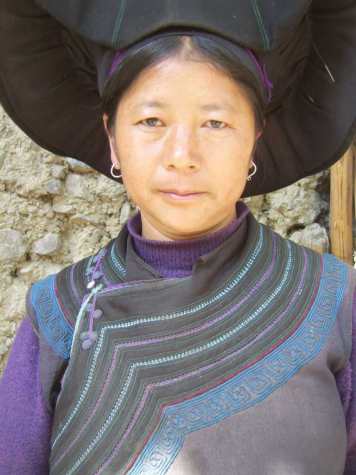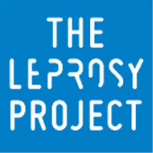
Jibu Wuzhi cannot remember her father’s face, he died when she was just 8 years old. From that time on her mother struggled to feed and clothe her and her older brother and sister. Asked what her happiest childhood memories were, she said that after her father passed away they never had enough to eat, but sometimes relatives would give them extra noodles or rice. Also during Yi New Year, when most families would slaughter a pig, they would have a chicken. The chicken represented a year’s savings. This was also the time relatives would share food & clothing with them. Jibu Wuzhi was diagnosed with leprosy at the age of 11. She continued to live at home, but after the death of her mother two year later, Jibu Wuzhi was taken by a cousin to live on her own in the leprosy rehabilitation village of Xide.
Her cousin gave her cereal when she went to Xide, but it lasted for less than a month. Having no formal status in the village and no money for transportation she was forced to walk back to her home village to change her residency. It was a three day trip each way. After she changed her status she was able to get a food subsidy from the government and could use some of her food to sell and exchange for clothes. Jibu Wuzhi was 14.
For the first year Jibu Wuzhi lived with two older women in a straw hut. The other villagers pestered her to marry; she wasn’t interested. A few times she was so afraid that she would be forced to get married, she ran away. Her neighbors finally gave up on playing match maker.
The man who finally became her husband had moved to the village with his father who suffered from leprosy. His mother had died years before. Though he himself did not have leprosy he stayed on in the village. The courtship started with Jibu’s husband presenting her with gifts including small toys, clothing, and fabric. After about a year he proposed. At first she rejected him, but he persisted saying that if she didn’t like him she should give the gifts back. After some consideration, Jibu Wuzhi realized that she didn’t have any means to support herself. Her right leg was weak and she liked the thought of having someone to take care of her. She accepted his proposal. Jibu Wuzhi was 16, her husband was 21.
They now have two daughters, one son and five grandchildren who still live in the village. Life is much better. She has her own livestock, steady income and enough to eat.
Jibu Wuzhi is a member of the Xide Embroidery Cooperative. She was taught to embroider by the teacher employed by The Leprosy Project. Some patterns she embroiders following the patterns shown to her by the teacher, others are her own creation. It takes her about 5 days to complete an embroidered bag. The embroidery program has improved her life significantly. Jibu Wuzhi is diabetic and she has to pay for her drugs. Before she joined the Embroidery Cooperative she had to sell her livestock to pay for her treatment. Now she can use the extra money she earns from embroidery to pay for her medicine. Her embroidery also gives her the opportunity to give gifts to friends and relatives.
Her cousin gave her cereal when she went to Xide, but it lasted for less than a month. Having no formal status in the village and no money for transportation she was forced to walk back to her home village to change her residency. It was a three day trip each way. After she changed her status she was able to get a food subsidy from the government and could use some of her food to sell and exchange for clothes. Jibu Wuzhi was 14.
For the first year Jibu Wuzhi lived with two older women in a straw hut. The other villagers pestered her to marry; she wasn’t interested. A few times she was so afraid that she would be forced to get married, she ran away. Her neighbors finally gave up on playing match maker.
The man who finally became her husband had moved to the village with his father who suffered from leprosy. His mother had died years before. Though he himself did not have leprosy he stayed on in the village. The courtship started with Jibu’s husband presenting her with gifts including small toys, clothing, and fabric. After about a year he proposed. At first she rejected him, but he persisted saying that if she didn’t like him she should give the gifts back. After some consideration, Jibu Wuzhi realized that she didn’t have any means to support herself. Her right leg was weak and she liked the thought of having someone to take care of her. She accepted his proposal. Jibu Wuzhi was 16, her husband was 21.
They now have two daughters, one son and five grandchildren who still live in the village. Life is much better. She has her own livestock, steady income and enough to eat.
Jibu Wuzhi is a member of the Xide Embroidery Cooperative. She was taught to embroider by the teacher employed by The Leprosy Project. Some patterns she embroiders following the patterns shown to her by the teacher, others are her own creation. It takes her about 5 days to complete an embroidered bag. The embroidery program has improved her life significantly. Jibu Wuzhi is diabetic and she has to pay for her drugs. Before she joined the Embroidery Cooperative she had to sell her livestock to pay for her treatment. Now she can use the extra money she earns from embroidery to pay for her medicine. Her embroidery also gives her the opportunity to give gifts to friends and relatives.

 RSS Feed
RSS Feed
